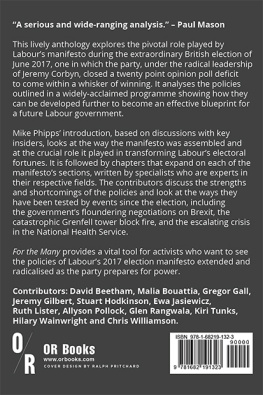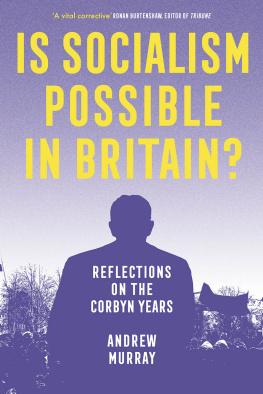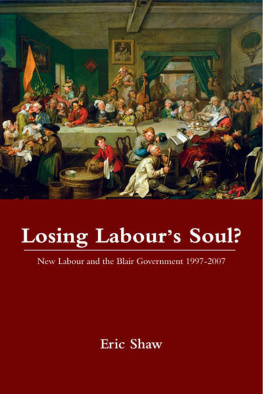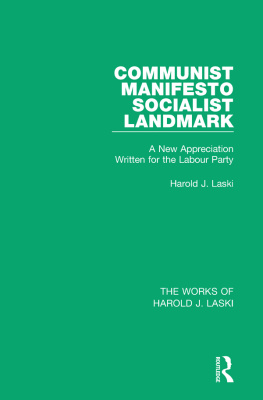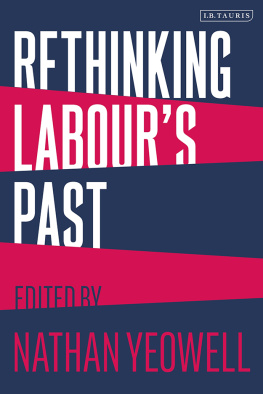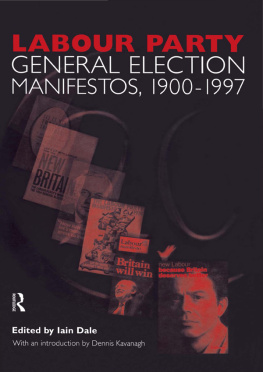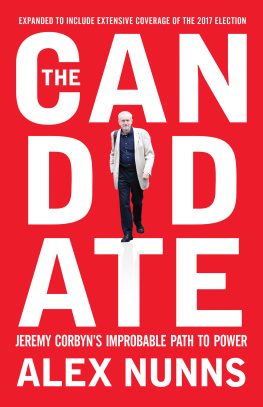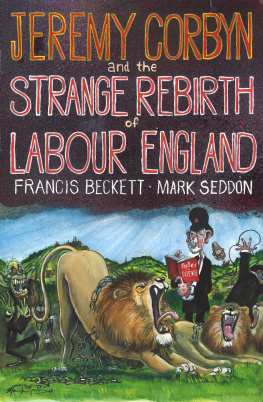


2017 The contributors
Published by OR Books, New York and London
Visit our website at www.orbooks.com
All rights information:
All rights reserved. No part of this book may be reproduced or transmitted in any form or by any means, electronic or mechanical, including photocopy, recording, or any information storage retrieval system, without permission in writing from the publisher, except brief passages for review purposes.
First printing 2017
Cataloging-in-Publication data is available from the Library of Congress.
A catalog record for this book is available from the British Library.
ISBN 978-1-682191-32-3 paperback
ISBN 978-1-682191-33-0 e-book
Typeset by AarkMany Media, Chennai, India. Printed by BookMobile in the United States and CPI Books Ltd in the United Kingdom.
PREFACE
Ken Loach
It was an election like no other. The establishment, through its press and broadcasters, gleefully forecast the demise of Jeremy Corbyn and his leadership. The old cliche of the longest suicide note in history to describe the manifesto was trotted out with tedious regularity. It seemed that the majority of Labour MPs could not bear to mention Jeremy Corbyn by name. They did not include the principal manifesto proposals in their leaflets and their disavowal of their own partys programme was shocking, not only in its disloyalty but in its stupidity. They were so detached from peoples needs that they did not realise how popular the manifesto would be.
Yet, despite all that, the election and Labours manifesto have become a source of hope for the left, the real left. This was a leadership that inspired enthusiasm and belief. For the first time in living memory, perhaps in the history of the party, the Labour leader supported workers in struggle. Railway workers, steel workers, junior doctors, teaching assistants all have had messages of solidarity from Jeremy Corbyn and John McDonnell. Unbelievable. Leaders of Labour actually supporting the cause of labour! The Tories and Blair-Brownites shared a collective shudder.
The 2017 manifesto is the mark of the change in the party. Where Blairs slogan was Labour means business, which, it was soon realised, meant big business, Corbyn borrowed from Shelley: Ye are many, they are few. Public ownership is now back on the agenda. Railways, the Royal Mail, the utilities and energy supply would be wholly or partly re-nationalised. The National Health Service would begin the process of removing all private contractors; everyone would be employed directly. We would once again build council homes to deal with the housing crisis that has been tolerated by both Tory and Labour governments. The market is rejected as a universal panacea: it will not always provide solutions, as its advocates claim. Where there is a need but no profit, the need goes unanswered.
Most importantly, we would invest with public money in sustainable industries in the most neglected and deprived areas. Security of work and income is recognised as fundamental to all aspects of our life.
There are proposals in the manifesto that reflect our need to live together with dignity, respecting our common humanity and showing solidarity with others at home and abroad. A foreign policy guided by the values of peace, universal rights and international law would shine like a good deed in a naughty world. It would change fundamentally our relationship with states with a record of oppression and illegality. The arms industry would suffer the consequences, as would trade, cultural and sporting links with countries to whose human rights abuses we currently turn a blind eye.
A promise to end fracking shows commitment to the environment, in rejecting the use of fossil fuels and in concern for our local landscape. Ending punitive social security sanctions and work capability assessments reflects our revulsion at this governments bureaucratic cruelty to the most vulnerable citizens. The Tories have used hunger as a weapon and forced hundreds of thousands of people to go to food banks. Labours manifesto shows a determination to end that. The same values are evident in the attitude to education: a move towards cradle-to-grave learning that is free at the point of use so that all may reach their full potential.
The section on art and culture should lift our spirits. Keeping open our libraries, providing an arts premium for primary schools and the belief that the arts are not the preserve of a few, but the entitlement of all, echo Labours 1945 manifesto. Creativity should be cherished for its own sake. This ought to be a rejection of the idea that art is concerned with producing commodities or promoting the tourist trade. Sadly, the manifesto does not make that leap. The phrase creative industries, words I would be pleased never to hear again, betray the writers priorities. Remember William Blake: Where any view of money exists art cannot be carried on, but war only.
The manifesto could have been bolder in other areas. Why should not all the utilities, natural monopolies, be returned wholly to public ownership? There would be no more private prisons, but why not remove all private involvement in prisons? It is stated that part-privatisation of probation services has failed but there is no commitment to end it.
Re-nationalise the railways, yes, but why not include all transport for a fully integrated system? Labour needs a policy for the media that deals with the ownership of the press and commercial broadcasting. The freedom of the press has come to mean the freedom of four or five wealthy individuals to promote their far right views. How would Labour change that? It is good to defend public service broadcasting and keep Channel 4 publicly owned but uphold the BBCs independence? Since when has the BBC been independent of government or the wider establishment?
This manifesto is a great step forward and these questions should not diminish the fundamental change that it represents. But they are important to consider for the next stage in the continuing struggle for the just society.
There is a further question. The consciousness of this electorate is caught in the struggle between Thatcherite notions of individualism and an objective reality of insecurity in many aspects of life. How can a party that represents the interests of labour, of the working class, present a programme that deals convincingly with current problems but is also consistent with this underlying principle: capital and labour will always be at each others throats? I hope the essays in this book will reflect on this essential question. Certainly Labour in this manifesto and, it is to be hoped, in the next, has committed to cutting back the power of capital. Is this to be the first stage in establishing public ownership of the commanding heights of the economy? Or is it limited to minimising the worst excesses of corporate power?
If it is the latter, then other questions will not go away. In this stage of capitalist development, can we expect to see again strong trades unions? Or secure, lifelong employment, albeit with a variety of different jobs? And sufficient taxes from multi-national corporations to sustain a comprehensive welfare state? If the answer is no, will the party of labour finally confront the implications? And how can the new technologies, central to the emerging patterns of work, be harnessed to benefit everyone, not used to maximise profits for a few while creating a casualised, exploited workforce and yet more food banks?

